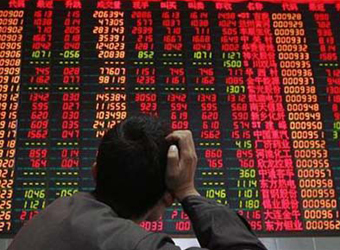Asian shares bobbed lower in a choppy session on Wednesday, hobbled by Wall Street’s losses as the long-awaited U.S. tax reform bill wound its way through Congress, while higher Treasury yields underpinned the dollar.
The Republican-led U.S. Senate approved the sweeping $1.5-trillion tax bill in the small hours of Wednesday morning. A re-vote by the House of Representatives was scheduled for later in the day, with approval expected, and the bill will then go to President Donald Trump to sign into law.
Asian market reaction to the passage was muted, with S&P e-mini futures ESc1 edging slightly higher, up 0.2 percent.
European stock futures STXEc1 were up 0.1 percent, portending a slightly firmer opening for the region, with DAX futures FDXc1 up 0.2 percent, CAC futures FCEc1 up 0.1 percent and FTSE futures FFIc1 0.1 percent lower.
MSCI’s broadest index of Asia-Pacific shares outside Japan .MIAPJ0000PUS was down slightly in afternoon trade, while Japan’s Nikkei stock index .N225 finished up 0.1 percent.
The Dow Jones Industrial Average .DJI shed 0.15 percent on Tuesday, the S&P 500 .SPX lost 0.32 percent, and the Nasdaq Composite .IXIC dropped 0.44 percent.
“I think people are getting more concerned about the tax bill,” said Harumi Taguchi, principal economist at IHS Markit in Tokyo. “Even if it’s passed, it will take some time to know whether or not it will have an impact on the economy.”
The bill slashes the corporate income tax rate to 21 percent from 35 percent. That would boost overall earnings for S&P 500 companies by 9.1 percent, according to UBS equity strategists, though some investors said those expectations are already reflected in recent stock market gains to record highs.
Congress is also struggling to pass a temporary spending bill by midnight on Friday to fund the government and avert a partial shutdown.
“We need to confirm the passage of the tax bill, and the avoidance of a shutdown by Friday, and these two things are necessary before the dollar can move higher, as the market waits for these developments,” said Masafumi Yamamoto, chief currency strategist for Mizuho Securities in Tokyo.
Higher U.S. Treasury yields bolstered the greenback on Tuesday, with the benchmark 10-year yield notching a seven-week high of 2.472 percent US10YT=RR. It last stood at 2.453 percent in Asian trading, compared with its U.S. close on Tuesday of 2.463 percent.
The dollar edged up 0.1 percent to 113.01 yen JPY=, while the euro was steady at $1.1835 EUR=.
The European currency got a lift from higher eurozone rates, gaining 0.5 percent on Tuesday, when central bank governors of Estonia, Slovakia and Germany all discussed the need to shift the debate from bond purchases to other tools such as interest rates.
“That’s re-igniting the debate about ECB tightening, so despite the outlook for the U.S. tax bill passage, euro-dollar is strong right now,” Mizuho’s Yamamoto said.
Against a basket of six rival currencies, the dollar was slightly higher on the day at 93.481 .DXY.
Bitcoin was down 7.1 percent on the Bitstamp exchange at $16,450 BTC=BTSP, after earlier losing almost one-fifth of its value from a peak hit just three days ago.
U.S. crude oil futures extended gains, helped by a North Sea pipeline outage, OPEC-led supply cuts and expectations that U.S. crude inventories had fallen for a fifth week. [O/R]
U.S. crude CLc1 was up 0.3 percent, or 15 cents, at $57.71 a barrel, after settling up 0.5 percent on Tuesday. Brent crude LCOc1 was 0.2 percent higher, adding 12 cents to $63.92 after gaining 0.6 percent overnight.
Source: Reuters


